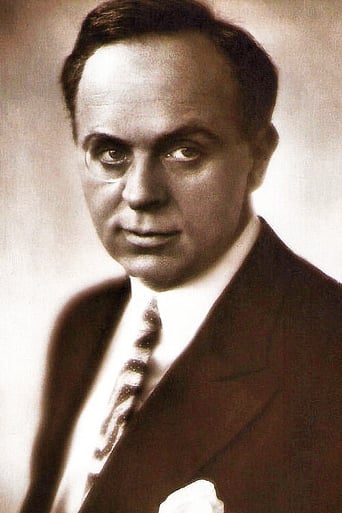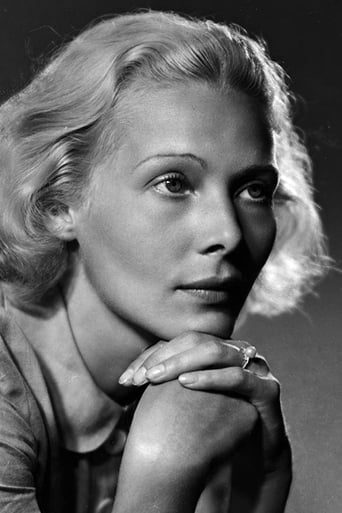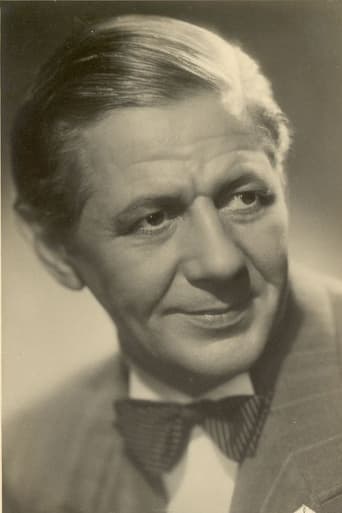FeistyUpper
If you don't like this, we can't be friends.
Gurlyndrobb
While it doesn't offer any answers, it both thrills and makes you think.
Hattie
I didn’t really have many expectations going into the movie (good or bad), but I actually really enjoyed it. I really liked the characters and the banter between them.
Candida
It is neither dumb nor smart enough to be fun, and spends way too much time with its boring human characters.
kidboots
I first saw this movie many years ago, completely unrestored and in a severely edited version but I was still carried away by the breath taking style and the twists and turns of the plot about a super spy who wanted world domination. So I was very happy to find this Kino edition with an hour of previously unseen footage. Like Lang's earlier film, "Dr. Mabuse", Haghi (Rudolph Klein-Rogge) is a master criminal extraordinare who leads several different lives - as a bank president and also as a circus clown. He is always one step ahead of the Russian, Japanese and German secret service, steals treaties and operates a radio network that brings him up to date headlines through a transmitter in his office. He has men working for him day and night, including a fruit vendor who stealthily parks his wagon in the street, cutting off a car chase and starts throwing cocoanuts which are really hand grenades."Throughout the world strange events transpire".... It is the world of spies and secret agents and disappearing ink and once again Lang holds up to ridicule the pompous bureaucrats and petty officials. A local vagrant has received a summons to appear before the local police. Willy Fritsch's introduction is a marvel of pantomimic acting but after being hustled into the station we find that he is really "No. 326" - one of the country's sharpest agents. He is put on the trail of Haghi and Haghi, in turn, puts one of his most beautiful operatives, Sonia (Gerda Maurus) in his way to seduce him. It is love at first sight (a bizarre date has them at a boxing match which also doubles as a nightclub, when the match is finished patrons instantly start dancing around the ring). When Haghi finds Sonia questioning her loyalty he captures and imprisons her at headquarters then sends another look alike agent, Kitty (Lien Deyers) out in her place. It is Kitty's job to charm the Japanese diplomat (Lupu Pick) and she does, appearing at first as a waif caught in the rain, then gradually insinuating herself into his life - until she has all the secret documents and his only recourse is to commit hari-kari.The last thirty minutes starts with an explosive train crash - both Sonia (who is on one last mission - Haghi says if she will fulfill it he will spare "No. 326"'s life, but of course he is lying) and "No. 326" are aboard. From then on there is a non stop last minute rescue and then on to the music hall for a final showdown.Rudolph Klein-Rogge was a master character actor but because most of the time Haghi was behind a desk, he didn't have a lot to do. Willy Fritsch went on to become Germany's (and Hitler's) number one actor, more at home in frothy, frivolous musicals. Lien Deyer was a discovery of Lang's and "Spies" was her first film. She and her husband fled to America during the upheaval of Germany in the 1930s but after that nothing much went right for her.
Thorkell A Ottarsson
Spione is a mixture of brilliance and stupidity. The camera-work was amazing and the same goes for the set. And the film has one of the greatest finale of all time.Spoilers Ahead!!! But then there are some really stupid scenes like when Haghi (the bad guy) shoots him self in the head but still talks and stands on his own to feet. And if Haghi was so powerful why didn't he just have No. 326 shot in the beginning in stead of waiting it out? And why should a spy working for the government help a women who has just shot a man, like he does for Sonya? And I have to say that the love story between No. 326 and Sonya was way too much over the top.Spoilers Finished!!! But don't misunderstand me. I think it was an fantastic film (8/10), better than Dr. Mabuse, der Spieler - Ein Bild der Zeit (1922). It was also interesting to see how much Bond has borrowed from it. It also reminded me of North by Northwest (1959) by Hitch. Not to mention Dr. Mabuse. I really felt like I was watching Dr. Mabuse no. II.I saw the Masters Of Cinema edition of the film (R2). The transfer is amazing. Extremely well done. I didn't care so much for the music though.
MARIO GAUCI
Fritz Lang, undeniably one of the greatest and most influential film-makers in all of cinema, is one of my favorites and, from his early work – which remains, perhaps, his most important – I only had a few of his surviving films still to catch up with. SPIONE was one of them and, now that I've watched it, I can confirm its stature as one of his very best, if relatively little-known.The film is basically a follow-up to Lang's seminal two-part DR. MABUSE, THE GAMBLER (1922) and, indeed, it's Rudolph Klein-Rogge himself – who originated the role of Mabuse – who plays the evil crimelord here (called Haghi and who is made-up to resemble Lenin!). SPIONE follows much the same pattern of intrigue, thrills and action; however, the film's narrative structure is not straightforward but rather elliptical and, even though ostensibly dealing with the conflict which may arise were a treaty to fall into the wrong hands, several major plot points are left deliberately obscure (in fact, we never get to know what the treaty actually contains – a precursor to Hitchcock's beloved "McGuffin", perhaps – or what Haghi's intentions are, once he gets his hands on it!). In this respect, the social conscience so pronounced in the Mabuse diptych – coming, as it did, on the heels of Germany's defeat in WWI – is largely jettisoned here in favor of romance (between a female spy desired, and being blackmailed, by Haghi and the Secret Service agent who is the mastermind's nemesis), eroticism (the ensnaring of a central political figure by a vamp in Haghi's service) and technical dexterity (ensuring that SPIONE's considerable 2½-hour running-time goes by rapidly and without any longueurs, in my estimation at least, as opposed to the sluggish and rather static Mabuse). It is not inconceivable, therefore, to discern in Lang's fanciful melodrama the germ for all the spy thrillers which followed – from Hitchcock to the James Bond extravaganzas and beyond.As befits a master story-teller like Lang, particularly during this most creative phase of his career, SPIONE is virtually a catalogue of memorable scenes (interestingly enough, the supplementary photo gallery includes shots from sequences that are missing in the main feature!) – chief among them a ghostly visitation, a ritual suicide, a train-wreck, a police raid on a bank and a stage performance by a clown; however – as opposed to the DVD back-cover, which blatantly spells out its most clever twist – in emulation of the film itself, I've refrained from giving too much away about them here
Brandt Sponseller
Fritz Lang is not a writer or director prone to following narrative conventions too closely. While that is admirable artistically, it can make his films relatively difficult viewing and risky. It's difficult because you can't expect Lang's films to have stories that unfold in a traditional way, so as a viewer, you have to work harder, and it's risky because the experimental nature doesn't always result in a successful finished artwork. Metropolis (1927) and Fury (1936) are two examples of Lang films with unusual approaches that work extremely well. M (1931) is an example of one that isn't quite so successful in my opinion, even though many people seem to love it. Spies is somewhere in the middle.Like M, Spies begins with more of a thematic collage. We're immediately dropped into a fast-paced, fast-cut sequence of spies stealing important documents and killing others when expedient. We also see news of this quickly filtering through both the spy world and the official media organizations. The sequence is impressive technically, but most viewers will be searching for the characters to latch onto. Also like M, Lang doesn't let viewers off that easily. He constantly introduces new characters for at least the first 40 minutes (of the 90-minute U.S. version). A number of the characters look similar, and most do not have much accompanying exposition to help viewers ground them. Making it more difficult, inter titles (this is a silent film) where characters' names are first presented often appear between two scenes with different characters, so that it's difficult to figure out which character the inter title is supposed to apply to.Additionally, the story is complex enough and hinges on small details to an extent where it can be difficult to follow on a first viewing. I had to watch the film twice to feel confident that I had a grasp on the plot. By the end of the first viewing, you know who the principle characters are, so on the second viewing you can focus more on them rather than the countless ancillary characters who keep appearing and disappearing.It might be difficult to count this as a flaw. There's no reason that films should be 100% accessible on a first viewing, and in fact, if you're someone who likes to watch a film more than once, a gradual unfolding on repeated exposures can be more desirable. But it's best to be forewarned. Expect to be confused unless you keep a scorecard, so to speak, and keep hitting pause.However, once you've sorted the film out, the basic gist turns out to be fairly simple and straightforward. An anti-government (the exact government isn't specified--it's rather left intentionally vague, except that we know it's somewhere in Europe) spy organization, headed by a man named Haghi (Rudolf Klein-Rogge), is after some important treaty. There are three copies of it, and Haghi is trying to intercept them all. Haghi's principle foe is the government's Secret Service Agency, which ends up putting a James Bond-like agent named 326, or Donald Tremaine (Willy Fritsch), on the case. Haghi sends his agent Sonia (Gerda Maurus) to gain information, and hopefully the treaty, from Tremaine. He also enlists the help of a convict whom he helped bust out of death row, Hans Morrier (Louis Ralph). Complications arise when Sonia and Donald fall in love. Haghi tries to get at another Secret Service affiliate, Doctor Masimoto (Lupu Pick) through another attractive female spy, Kitty (Lien Deyers). There is a lot of double crossing, and there are a lot of spy versus spy machinations. The film focuses on these and the difficult romance, as Haghi does the typical megalomaniacal "evil genius" thing of trying to take over the world (although just how he plans to do this with a treaty and his odd combination of public vocations remains a mystery).Lang is often thought of as a heavily visual director. In conjunction with infamous cinematographer Fritz Arno Wagner, who lensed such masterpieces as F. W. Murnau's Nosferatu (1922), Lang doesn't disappoint on that end. There are a number of conspicuously "arty" shots, such as a complex of staircases in Haghi's bank, Cabinet of Dr. Caligari (1920)-like rooftops, or the marvelously fantastical imagery of the final clown performance (you have to see the film to understand why there's a clown in it), but Lang and Wagner are just as good with more subtle compositions.But there are flaws, too. Even viewing the film a couple times, the overly complex details of the plot can be hard to follow and many are left as dangling threads. The overall gist of the plot is good, and Spies certainly has influenced subsequent films in the genre, but there are script problems here.Although Lang is good at creating suspense when he wants to (for most of M, he didn't seem interested in it), and he does do effectively quite a few times here, he still directs and edits action scenes a bit awkwardly. Also, the U.S. 90-minute version is satisfactorily paced, which helps the suspense, but it is also obviously sped up. The film was shot at 16 frames per minute and IMDb lists the "original" version at almost twice as long. If Spies were slowed down to run close to 3 hours, the pacing would be off. The plot would unfold too slowly.For me, this is a middling silent film, as well as a middling Lang film, thus earning my 7 rating, or a "C", but worth watching for serious fans of thrillers, crime and espionage flicks. As always, Lang is a good "ideas" man, and this film can make you feel as if the whole world must consist of spies, or at least people whom you can't exactly trust.







